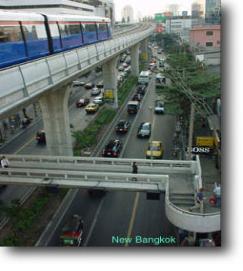Thailand Stocks, a brief introduction.
Observations on the Thai Stock Exchange. September 2025
"Firms with higher growth, lower risk and higher dividend payout ratios, other things remaining equal, should trade at much higher multiples of earnings than other firms". By the authoritative book: "Investment Valuation", authored by Aswath Damodaran Published in 2002, by Wiley Finance.
Yet, this is precisely often not so in Thailand due to large market inefficiencies. Value investing for high dividends has for many years been overall rewarding on the Thai Stock Exchange (SET). But not since 2016. Post Covit it caught up but since has lagged again.
So why does this investor paradox occur on Thailand’s stock market?
Foreign institutional investors are often misguided when it comes to investing in the real ‘blue chip' stocks in Thailand. They have much higher share liquidity mandates then we individual investors. As well as the Thai SET is increasingly punter/speculative driven so indirectly nurtured by the brokers. This results in a few very overvalued big cap stocks getting all the attention -and capital.
This market inefficiency is the result of 2 main reasons:
1) It is no secret that Thailand’s stock market is dominated by local individual speculators which can count to over 50% of total trading volume in recent years, according to the SET Investor Guide. Short term trading remains an ingrained way among Thai investors and brokers whom view the SET more like a casino, than a savings intermediary. These dominant local investors like to day-trade the most liquid or rumor driven companies. Such local participants are cherished by Thai brokers, who encourage such a trading mentality, so to generate higher commissions. Over 30 years on, the Thai "equity culture" still has not had enough time to evolve into more rational & balanced ways. This reality is this brings on stock market pricing in-efficencies to be explored. But don't count on Thai brokers to help you on that.
2) The global institutions, banks and so called "pooled funds" can only consider very large Thai shares for investment. Purely due to their own large imposed share liquidity requirements. Global institutions as well as mutual funds have strict mandates on size and consider only investing in shares which trade in the millions of US$, every day. The same is true with so called Exchange Traded Funds (ETF's), which by definition only own the largest of capitalized Thai shares. ETF funds have hugely distorted fair values, but this is another subject. But these have largely exited the Thai stock market in recent years.
Over many years a vacuum of value has emerged in select secondary Thai shares; often the type of companies which represent the real back bone of most honest and hard working Thai people. These under owned and researched SET/MAI listed companies make up some 2/3 of the Thai economy, and yet (again) are hugely under-represented by the institutions, brokers or traders alike. This mis-allocation of capital progressing already for over a decade, caused the investment spotlight to shine ever more on largesse, rather then investor value. While these mega companies have higher daily trading liquidity, besides often market volatility, they also too often have lower earnings growth rates -and frequently lower dividend yields.
The vast majority of business news as well as local & international broker research and other reports, focus almost exclusively on large capitalized stocks and more speculative sectors. Hence, over the years a classic market pricing distortion emerges. (Further, broker research reports can be biased due to conflicts of interest, and dis-interest in smaller capitalized companies)
 The Thai Technology sector is a prime example of this bias, with DELTA (p/e 150) being the speculative darling. Thai banks are very solid but if you look a bit further you can find more innovative stock picks with higher earnings growth potential.
The Thai Technology sector is a prime example of this bias, with DELTA (p/e 150) being the speculative darling. Thai banks are very solid but if you look a bit further you can find more innovative stock picks with higher earnings growth potential.
Countless foreign institutions used to get dragged into the “Thai bank trap”, only to be relatively disappointed over time, with their just average performance to investors. Some then leave Thailand questioning if superior results can ever be obtained. Yet, far better & proven alternatives exist! But the institutions, hedge funds, mutual funds ETF funds, and local day traders simply rarely consider these. They are and remain ever more, victims of their largesse and miss out many "diamonds in the rough".
It’s a reported fact that barely 100 out of the over 700 companies listed on the SET are researched by the brokers, this even while many of these under-researched smaller and mid cap. companies' have been outperforming local and global stock indexes on and off, for many years but not since 2016. Their p/e's are often lower, even while their net profits on average grow faster. Yet, despite their superior performance, most remain undervalued strictly due to their capitalization size. Sorry for the repeat.
All this has been coined the "complexity economy", as is thoroughly explained in the most important business book of the year called "The Origins of Wealth", by Eric D. Beinhocker, Random House Business books 2007. Its the radical remaking of economics where markets are hardly rational and stock prices rarely at an equilibrium price. "We so see that real world markets are almost never in equilibrium..." Eric D. Beinhocker. This increasingly understood reality gives understanding why on the Thai stock market discrepancies linger on.
A select group of astute investors are catching on that these lower valued, faster growing listed Thai companies -in addition paying substantial dividend rates, often around 2 - 5% per year, or higher then SET market averages. As the general level of interest rates in Thailand as around the world remain low regular high cash dividend rates have gotten more and more treasured by rational blue chip investors around the world. In year 2019 weve seen yet again a continuation or drop of ultra low interest rates. Currently its been reported some 17 trillion US$ is parked in negative % return investor saving vehicles.
For the past 30 years on location in Thailand, in 1997 founding Thaistocks.com, I have intensively focused on the value investing theme as a way to reduce market risk and increase total returns. Rational individual investors in Thai stocks should focus on "what Thailand does best -or is most competitive at" and this too often just does not include the exchanges' daily share traded volume leaders.
We cannot fault the funds or institutions for their own imposed constraints as they are just too large to take advantage of the better valued, but less liquid, high dividend yielding secondary Thai shares. If a fund manages say 1 Bill. US$, the minimum amount they must invest per stock, is around 20-60 mill US$. Yet in practice, this is by far too large of an amount to be absorbed by most secondary Thai shares here. Their own mandates & protocol simply prevent them to consider anything less than most liquid shares. Hence, some of the best local stock values remain completely of their radar screens.
To summarize then :
1) While often being leaders in important industries, this group of value shares is vastly neglected for the above stated "artificial" reasons.
2) Despite long term profit growth, being twice as fast as the SET average, these secondary stocks still trade at often at a discount to the Thai average market p/e multiple. This discount however has narrowed in the recent past.
3) Many are quality and for many years already established growth companies, with little debt and low p/e ratios -and yet have very high dividend rates, often yielding 5-7% annually, or up to twice or more the 10 year Thai government bond yield....and 20 times more then Thai bank saving account yields!
For nearly 30 years on location, I have analyzed, visited, researched and demonstrated through Thaistocks.com that there are many exceptional "value" opportunities available in Thai stocks for those who are willing to take a closer look and not invest millions of Dollars. Over time, this investor theme has proven to be very rewarding and so for many years -as we can here document. This came abrubtly to an end in 2016, when smaller Thai cap stock indices started a considerably price correction.
In the past I was able to prove regularly that such a smaller cap. value portfolio fluctuates less, quarter to quarter, year over year, -and yet produce better total returns, as compared to the larger capitalized shares. Total returns means capital gains plus all dividends. In investment finance, risk is always defined by portfolio volatility. Since year 2016 this has become more difficult as the market has all but stagnated, for now. In 2022 I turned Thai stocks outright bearish for the first time ever and stated so at my front page.

The conclusion is clear, for a diversified portfolio into year 2026 smaller cap value shares on the SET can fluctuate less, perform overall better over time due to higher growth rates and have much higher dividend yields -as compared to the Thai SET market averages. They so "taste great and are less filling", while often being the performance stars...over time. Not least they have just about 0 correlation to overvalued bubbly US stocks.
Best Regards,
Paul A. Renaud www.thaistocks.comPaul Renaud, a Swiss national, near 30 years -on location- professional experience around all aspects to successful Thai stock exchange investing. He is an ex-Morgan Stanley licensed broker from Chicago USA. Mr. Renaud speaks fluently German Swiss-German, English and French.
His professional resume can be seen here:
http://www.thaistocks.com/index.php?module=Pagesetter&func=viewpub&tid=2&pid=208
Recent Thaistocks.com Institutional and Private Member Comments :
"A must have subscription for any one interested in investing in Thailand"
-Eric Bidinger, Analyst - Merrill Lynch Thailand
"An excellent and helpful service. Superior to sell side analysis. Renaud uncovers stocks that are real values and is not afraid to take a controversial position"
-James Morton, Fund Manager - European American Securities.
“We have found Paul Renaud’s work to not only be atypical and very provocative but also thorough, concise and extremely compelling. ThaiStocks.com is recommended to anyone interested in a broad, clear, unbiased view of the Thai economy and marketplace”
Lee Bannon, Brevan Howard Asset Management London.
"It’s informative and provides independent analysis of the stocks not regularly covered by international brokers by incorporating local knowledge with international issues"
Vikas Kawatra, Institutional Broker - Kim Eng Thailand.
“Thaistocks.com offers the type of independent and astute research that should be more commonplace on Wall Street today”
-Emanuel Balarie, VP Investments - Euro Pacific Capital.
“Paul Renaud brings to bear his experience as an investment professional on the two continents of Europe and North America to analyze stocks in Thailand. He helps expose tricks of Bangkok insiders and market manipulators who turn out to be not very exotic after all, since their methods are as old as stock trading. But it helps to have a man on the spot to watch their behavior and help you trade intelligently. Paul fills the bill with articulateness and honesty”
Vivian Lewis, Founder and Editor of Global Investing.com.
"I haven't calculated my return on the thaistocks.com subscription fees, but it must surely be obscene (and Ticon hasn't even really taken off yet). Well, perhaps you are building up extra karma". T. Lippert, Stanford University CA. USA.
Thaistocks.com

